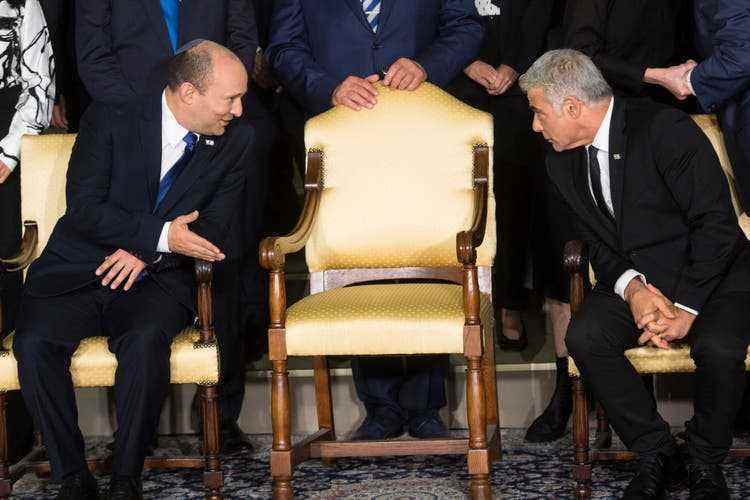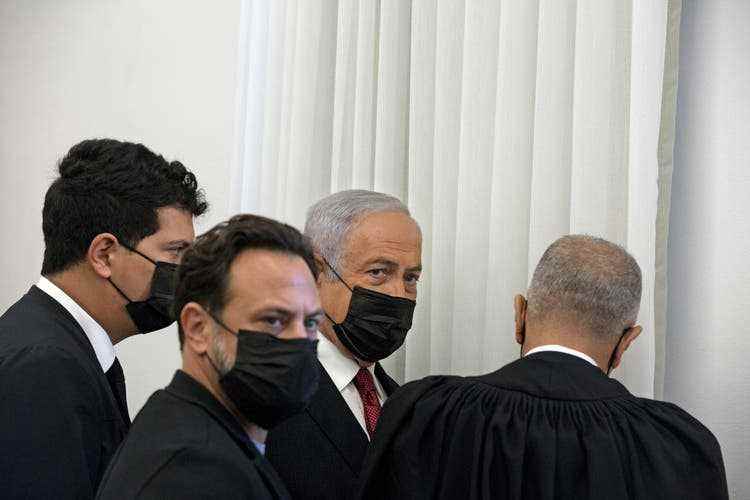After a year, the balance of the unusual coalition around Naftali Bennett and Yair Lapid is not so bad. However, she may be on the verge of extinction.
Israeli Prime Minister Naftali Bennett is struggling with withdrawal movements within his own ranks.
Israeli commentators didn’t give a damn about Naftali Bennett’s government when it took office a year ago. The coalition of eight parties is ideologically too heterogeneous. The only thing they have in common is disgust for longtime Prime Minister Benjamin Netanyahu; The tenor was that as soon as she got into everyday life and the associated adversities of governing, the stinging and stinging would begin. The commentators gave Bennett three days, a maximum of one week.
Measured against these forecasts, the coalition that Foreign Minister Yair Lapid has forged is a success. For a year she has held up bravely, despite the crises, of which there have not been too few. Israel survived the omicron wave of the coronavirus pandemic without further lockdown. Bennett’s motto “living with the virus” worked. Despite the war in Ukraine and its aftermath, the country is doing well economically.

When the world was still fine: Bennett and Yair Lapid’s cabinet (r.) Gets ready for the group photo on June 14, 2021.
The economy shrank in the first quarter after record growth last year. In the meantime, however, it is picking up again, and the central bank is forecasting growth of over five percent for the rest of the year, despite inflation. Finance Minister Avigdor Lieberman not only persuaded the government to cut government spending, he also abolished regulations that make imports more difficult and expensive. There is no reason “why a vacuum cleaner approved in Berlin” should not be good enough for Israel, said Lieberman. More competition leads to a reduction in the high cost of living.
A bad seller
The government has also abolished the chief rabbinate’s monopoly over kosher certification. Gradually, shops, restaurants and hotels are given the freedom to choose a provider. The same applies here: more competition leads to a reduction in costs. In terms of foreign policy, the government was able to consolidate and even expand the normalization agreements with the United Arab Emirates (UAE) and other countries. At the end of March, the foreign ministers of the Emirates, Bahrain, Morocco, Egypt and the USA met with Lapid for a historic summit in the Negev desert. The UAE recently became the first Arab country to sign a free trade agreement with Israel.

A short breather from domestic political wrangling: Bennett is received in Abu Dhabi by Mohammed bin Zayed, ruler of the Emirates.
Of course, the government also came into office with a promise to overcome the deep polarization of Israeli society. Actually, she would have ideal conditions: The coalition includes parties from the right to the left spectrum and, for the first time, an Arab party. Nevertheless, she does not succeed in filling in the ditches. On the one hand, this is because Bennett is a bad salesman in his own right. His appearances seem brittle, his speeches often lack persuasiveness. On the other hand, it is due to his predecessor Benjamin Netanyahu, who is sowing discord to the best of his ability in his role as leader of the opposition.
Netanyahu’s attacks are primarily aimed at the right-wing parties in government. He accuses them of treason for denying him another term, thereby preventing a “truly right-wing government.” The attacks did not fail to have an effect. The coalition has now lost its narrow majority in parliament.
Likud continues to be the strongest party
Netanyahu, who is on trial for corruption and other offences, is primarily concerned with returning to power. The fundamental opposition, of course, leads to the absurd situation that his party, the Likud, and its ultra-Orthodox allies vote against bills even when they are a core concern of their electorate. This is currently the case on the issue of jurisdiction in the settlements in the occupied West Bank. Shortly after the conquest in 1967, the government at the time passed what was known as an emergency law, which has since been repeatedly extended and expanded. In contrast to the Palestinians, who are subject to military jurisdiction, the settlers are subject to Israeli civil and criminal law.

Around half a million Jewish settlers live in the occupied West Bank. Unlike the Palestinians, they are subject to Israeli civil and criminal law.
In a first reading, two Palestinian MPs from the moderate Islamist party of Mansur Abbas and the leftist Meretz in the government voted against the extension. With one MP from Bennet’s party abstaining, the government would have missed the necessary majority anyway. Since then, of course, the media has primarily beaten the Arabs. The “experiment” to get her into government failed. What sounds like a stab in the back legend is not least the result of the scorched earth policy that Netanyahu is increasingly pursuing.
Although Netanyahu courted Abbas himself a year ago, today he associates his party with terrorists. A government that is supported by “terrorists” cannot be trusted. His own, once conservative party supports the course and has moved further to the right. The electorate too. According to polls, the Likud would again be the strongest faction if elections were held now.
The dangerous thing is, of course, that Netanyahu’s smear campaign has made the right-wing extremists acceptable. In the event of new elections, they would have a good chance of doubling their share of seats and could even become the third largest faction in the Knesset. In an unusual move, Bennett recently addressed the “silent Zionist majority” and urged them to speak out. Like a year ago, the country is again faced with the choice between a functioning state and sliding into chaos and submission to the needs of a single man (Netanyahu), he wrote in a 27-page brochure. “Don’t leave us alone. Make yourselves heard.”
The Netanyahu Syndrome
According to commentators, the days of the Bennett-Lapid government are numbered. Every day they feed the public with new rumors about which member of parliament is planning the jump and is negotiating with the Likud. You could be wrong again. It cannot be ruled out that the coalition will negotiate a compromise on the controversial settler law or that Netanyahu will give in, as in other cases. But even if this succeeds, peace will hardly return.
Israel has been in a permanent political crisis for four years. The country is suffering from “Netanyahu Syndrome”, say critics of the opposition leader. Overcoming this will take time. The crucial question on which opinions differ is still: For or against «Bibi»? As long as nothing changes, he can continue to hope for a return to the controls of power. Lapid, the architect of the coalition, announced that he would do everything to preserve it. Should this government fall, the lesson would be that “poison and incitement” work in politics. “I refuse to accept that.”

